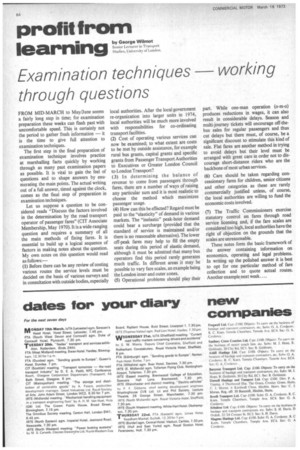profit from
Page 66

If you've noticed an error in this article please click here to report it so we can fix it.
learning by George Wilmot
Senior Lecturer in Transport Studies, University of London_
Examination techniques through questions working
FROM MID-MARCH to May/June seems a fairly long step in time; for examination preparation these weeks can flash past with uncomfortable speed. This is certainly not the period to gather fresh information it is the time to give full attention to examination techniques.
The first step in the final preparation of examination technique involves practice at marshalling facts quickly by working through as many past examination papers as possible. It is vital to gain the feel of questions and to shape answers by enumerating the main points. The actual writing out of a full answer, timed against the clock, comes as the final step of preparation in examination techniques.
Let us suppose a question to be considered reads "Discuss the factors involved in the determination by the road transport operator of passenger fares" (CIT Associate Membership, May 1970). It is a wide-ranging question and requires a summary of all the main methods of fixing fares. It is essential to build up a logical sequence of factors in making notes about the question. My own notes on this question would read as follows: (1) Before there can be any review of costing various routes the service levels must be decided on the basis of various surveys and in consultation with outside bodies, especially local authorities. After the local government re-organization into larger units in 1974, local authorities will be much more involved with responsibilities for co-ordinating transport facilities.
(2) Cost of operating various services can now be examined; to what extent are costs to be met by outside assistance, for example rural bus grants, capital grants and specific grants from Passenger Transport Authorities to Executives or Greater London Council to London Transport?
(3) In determining the balance of revenue to come from passengers through fares, there are a number of ways of raising any particular sum and it is most realistic to choose the method which maximizes passenger usage.
(4) How can this be effected? Regard must be paid to the "elasticity" of demand in various markets. The "inelastic" peak-hour demand could bear a surcharge (provided that the standard of service is maintained and/or there is no reasonable alternative). The lower off-peak fares may help to fill the empty seats during this period of elastic demand, although it must be admitted that many bus operators find this period rarely generates much traffic. In different areas it may be possible to vary fare scales, an example being the London inner_and outer zones.
(5) Operational problems should play their part. While one-man operation (o-m-o) produces reductions in wages, it can also result in considerable delays. Season and multi-journey tickets will encourage off-thebus sales for regular passengers and thus cut delays but there must, of course, be a significant discount to stimulate this kind of sale. Flat fares are another method in trying to avoid delays but their level must be arranged with great care in order not to discourage short-distance riders who are the backbone of most urban services.
(6) Care should be taken regarding concessionary fares for children, senior citizens and other categories as these are rarely commercially justified unless, of course, the local authorities are willing to fund the economic costs involved.
(7) The Traffic Commissioners exercise statutory control on fares through road service licensing and, if the fare scales are considered too high, local authorities have the right of objection on the grounds that the scales are unreasonable.
These notes form the basic framework of the answer containing information on economics, operating and legal problems. In writing up the polished answer it is best to opt for one particular method of fare collection and to quote actual routes. Another example next week.. ..
























































































































